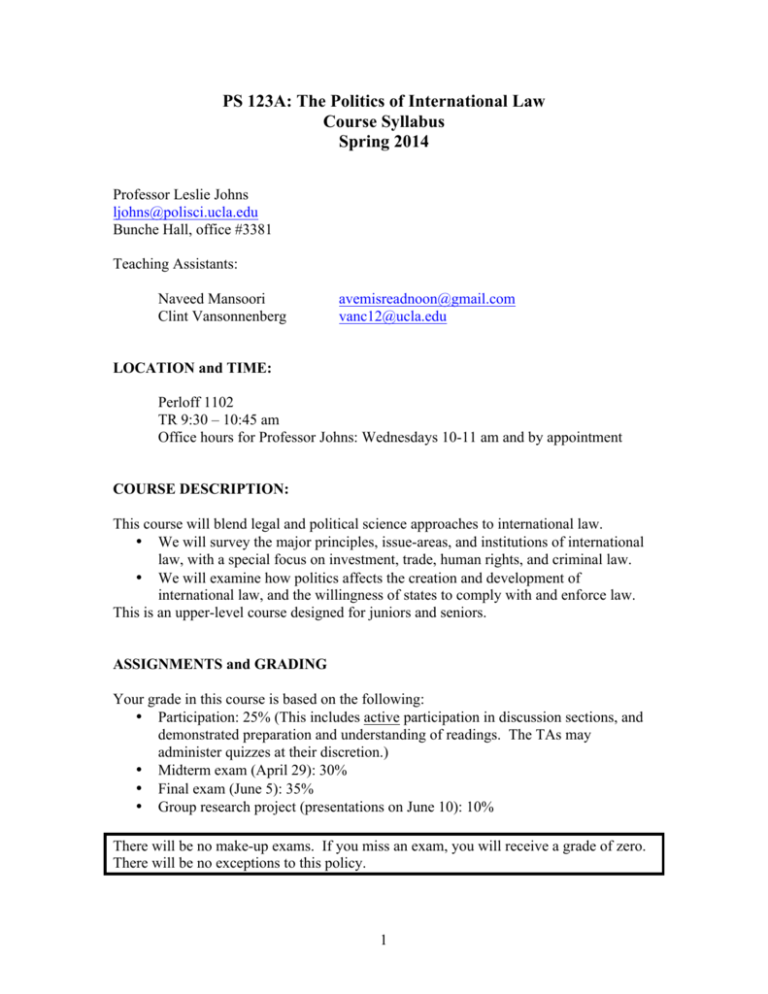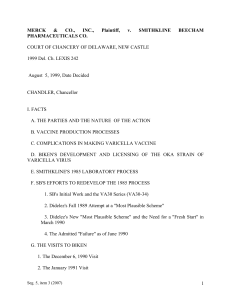PS123A International Law
advertisement

PS 123A: The Politics of International Law Course Syllabus Spring 2014 Professor Leslie Johns ljohns@polisci.ucla.edu Bunche Hall, office #3381 Teaching Assistants: Naveed Mansoori Clint Vansonnenberg avemisreadnoon@gmail.com vanc12@ucla.edu LOCATION and TIME: Perloff 1102 TR 9:30 – 10:45 am Office hours for Professor Johns: Wednesdays 10-11 am and by appointment COURSE DESCRIPTION: This course will blend legal and political science approaches to international law. • We will survey the major principles, issue-areas, and institutions of international law, with a special focus on investment, trade, human rights, and criminal law. • We will examine how politics affects the creation and development of international law, and the willingness of states to comply with and enforce law. This is an upper-level course designed for juniors and seniors. ASSIGNMENTS and GRADING Your grade in this course is based on the following: • Participation: 25% (This includes active participation in discussion sections, and demonstrated preparation and understanding of readings. The TAs may administer quizzes at their discretion.) • Midterm exam (April 29): 30% • Final exam (June 5): 35% • Group research project (presentations on June 10): 10% There will be no make-up exams. If you miss an exam, you will receive a grade of zero. There will be no exceptions to this policy. 1 GROUP RESEARCH PROJECT One component of the course will be a group research project. Each section will be divided into five groups, each with 3-5 students. Each group will choose a recent case heard by an international court, research legal and political aspects of the case, and then make a presentation on June 10. These presentations will be evaluated by UCLA alumni who work in law or related fields. TEXTS Required text: Shaw, Malcolm. (2008) International Law. Cambridge: Cambridge University Press. 6th Edition. New copies of this text in paperback sell for $60.00-80.00. Cheaper used copies are widely available from internet retailers. Please be aware that content in textbooks can sometimes change when the publisher issues a new edition. You will be held responsible for material in the 6th edition (dated 2008). If you choose to buy an earlier version of the textbook, you do so at your own risk. A copy of the textbook will be placed on reserve in Powell College Library. Other required readings: These will be made available on the course web-site at: https://moodle2.sscnet.ucla.edu/course/view/14S-POLSCI123A-1 ACADEMIC INTEGRITY All UCLA students are bound by UCLA’s Student Conduct Code, which is available at: http://www.deanofstudents.ucla.edu. As required by UCLA procedures, any suspected or alleged misconduct---including plagiarism and cheating---will be automatically reported to the Dean of Students. If you have any questions or concerns about what constitutes plagiarism, you should consult with your TA, professor, or the Office of the Dean of Students. 2 TOPICS and READINGS Week 1: Sources and institutions (Apr 1 & 3) Readings: Shaw, Chapter 3: “Sources” -- Read the full chapter. You may skim pages 72-93 (the section on “Custom”). Shaw, Chapter 19: “The International Court of Justice” Section: No materials. Sections will be administrative. Week 2: Law of treaties (Apr 8 & 10) Readings: Abbott, Kenneth W., and Duncan Snidal. (2000) “Hard and Soft Law in International Governance.” International Organization. 54: 421-456. --Read pages 421-450 only. Shaw, Chapter 16: “The Law of Treaties” Section: Materials on legal status of unilateral declarations: Nuclear Tests - Summary of order of provisional measures - Redacted majority opinion (on the merits) Week 3: Custom (Apr 15 & 17) Readings: Shaw, Chapter 3: “Sources” --- Read pages 72-93 only (the section on “Custom”). Goldsmith, Jack L., and Eric A. Posner. (1999) “A Theory of Customary International Law.” The University of Chicago Law Review. 66(4): 11131177. – Read pages 1113-1135 and 1158-1167 only. Section: Materials on custom in maritime delimitations: North Sea - Summary of case in Rosenne’s - Redacted majority opinion - Redacted dissenting opinion of Judge Lachs - Text of the Geneva Convention on the Continental Shelf of 1958 (for reference) Form into groups for research project. 3 Week 4: Diplomatic and consular relations (Apr 22 & 24) Readings: Brownlie, Ian. (2003) Principles of Public International Law. Oxford: Oxford University Press. Chapter 17: “Diplomatic and Consular Relations” Materials on consular notification cases: - Vienna Convention on Consular Relations (Paraguay v. United States of America) – summary of 1998 order of provisional measures - LaGrand (Germany v. United States of America) – redacted 2001 judgment - Avena and Other Mexican Nationals (Mexico v. United States of America) – redacted 2004 judgment - Text of the Vienna Convention on Consular Relations of 1963 (for reference) Section: T Materials on US v. Devyani Khobragade: h - Indictment from US District Court, Southern District ofe New York - Collected news articles r - Text of the Vienna Convention on Diplomatic Relations e of 1961 (for reference) Group research memo due. Week 5: Midterm exam and guest speaker (April 29 & May 1) Readings: None. Section: Group meetings with Professor Johns. Midterm Exam: Tuesday, April 29 in lecture Guest Speaker: Thursday, May 1 in lecture w i l l b e n o l e c t u r e o n 4 T h u r s d a y , A Week 6: Investment law (May 6 & 8) Readings: Guzmann, Andrew. (1998) “Explaining the Popularity of Bilateral Investment Treaties: Why LDCs Sign Treaties that Hurt Them.” Virginia Journal of International Law. 38: 639-688. Section: Krauss, Michael I. (2000) “NAFTA Meets the American Torts Process: O’Keefe v. Loewen.” George Mason Law Review. 9: 69-98. – Read pages 69-91 only. Week 7: Trade law (May 13 & 15) Readings: Van den Bossche, Peter. (2005) The Law and Policy of the World Trade Organization. Cambridge: Cambridge University Press. - WTO law and principles: section 1.3 (pages 35-44) - WTO dispute settlement: sections 3.1-3.2 (pages 173-182) - General exceptions: sections 7.1-7.2 (pages 596-624) Milner, Helen V., B. Peter Rosendorff, and Edward D. Mansfield. (2004) “International Trade and Domestic Politics: the Domestic Sources of International Trade Agreements and Institutions.” In The Impact of International Law on International Cooperation. Cambridge: Cambridge University Press. Section: Materials on US-Shrimps - Redacted Panel report of 15 May 1998 -- Skim for background info - Redacted Appellate Body report of 12 October 1998 - General Agreement on Tariffs and Trade (GATT 1947): preamble and Article XX (for reference) Week 8: Human rights law (May 20 & 22) Readings: Shaw (2005), Chapter 6: “The International Protection of Human Rights” Moravcsik, Andrew. (2000) "The Origins of International Human Rights Regimes: Democratic Delegation in Postwar Europe" International Organization. 54: 217-252. – Read pages 217-243 only. Section: Materials on freedom to manifest religion: - Redacted majority opinion from the “Teacher Headscarf” case (2003), German Constitutional Court. - Redacted majority opinion from Sahin v. Turkey (2005), European Court of Human Rights. Title and abstract for group project due. 5 Week 9: International criminal law (May 27 & 29) Readings: Shaw, Chapter 8: “Individual Criminal Responsibility in International Law” --- Read pages 397-417 only. Gilligan, Michael J. (2006) “Is Enforcement Necessary for Effectiveness? A Model of the International Criminal Regime.” International Organization. 60: 935-967. – Read pages 935-943 and 951958 only. Section: Materials on immunity from criminal prosecution: Arrest Warrant - Redacted majority opinion Week 10: International law in the US (Jun 3 & 5) Readings: Materials on U.S. Supreme Court response to Avena: ---. (2005) “U.S. Strategy for Responding to ICJ's Avena Decision.” American Journal of International Law. 99: 489-492. - Redacted majority opinion from Medellin v. Texas (2008), U.S. Supreme Court. Section: None Final Exam: Thursday, June 5 in lecture Group Presentations: June 10 (location TBA) 6








